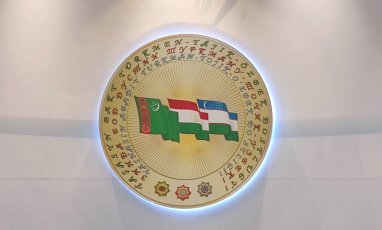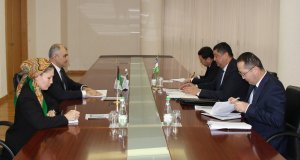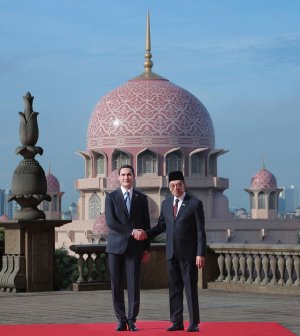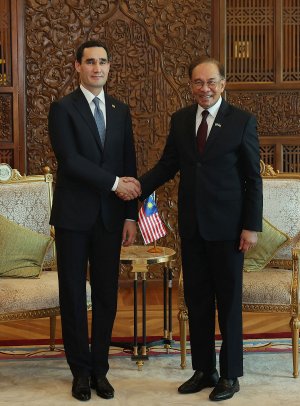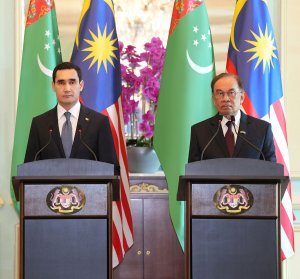As a result of the high-level meeting held in Ashgabat in the format “Turkmenistan, Tajikistan, Uzbekistan”, Presidents Serdar Berdimuhamedov, Emomali Rahmon and Shavkat Mirziyoyev adopted a Joint Statement, which noted the following:
1. The parties noted the importance of mutual efforts undertaken by Turkmenistan, the Republic of Tajikistan and the Republic of Uzbekistan to ensure peace, security and stability, strengthen the climate of trust and mutual understanding on a global and regional scale.
2. The Parties agreed to continue to strengthen cooperation between their states within the framework of international organizations, primarily in the United Nations, as well as in other international and regional platforms.
3. The parties stressed their readiness to continue to support each other's candidatures for elected bodies in the United Nations and other international and regional organizations.
4. The parties noted the importance of strengthening cooperation in the fight against terrorism, separatism and extremism in all their forms and manifestations, as well as against cross-border organized crime, drug trafficking, cybercrime, human trafficking and illegal migration. They stressed the need to work together to combat these challenges and threats, and also reaffirmed their readiness to continue to support each other on issues of common interest.
5. Having considered the issues of trade and economic relations, the Parties confirmed the importance of cooperation in this area and the priority of strengthening and expanding economic partnership between the countries based on the principles of equality, mutual benefit and consideration of each other's interests. The parties expressed a common opinion on the need to create favorable conditions for the further development of economic cooperation between their countries.
6. The parties, noting the importance of developing cooperation in the energy sector, stressed the particular importance of cooperation in the field of supplies of natural gas, oil and oil products, as well as electricity. In this regard, the Parties, relying on the positive experience of trilateral cooperation in the field of energy, agreed to hold negotiations at the level of heads of energy departments in the second half of 2023 in order to consider the possibilities of joint activities in the oil and gas and electricity sectors.
7. Given the great potential of the three countries in the field of transport, logistics and transit, the Parties attach particular importance to the development of cooperation in the field of transport.
8. In order to expand cooperation in the field of transport and use the transit potential of the three countries, the Parties stressed the importance of intensifying multimodal transportation along the transport route Tajikistan-Uzbekistan-Turkmenistan, which provides access for the three countries to seaports, including the Caspian Sea and the Persian Gulf.
9. The parties agreed to continue systemic mutually beneficial cooperation aimed at further optimizing tariffs and providing favorable conditions for transit transportation of foreign trade goods, and to this end, the parties instructed the heads of transport departments of their states to hold a meeting before the end of this year.
10. The parties paid attention to the development of industrial and industrial cooperation and agreed to expand long-term mutually beneficial cooperation through the creation of joint ventures in the textile, chemical, construction and other industries.
11. The parties expressed their support for activities and projects aimed at stimulating trade and economic relations and developing the entire transport and communication infrastructure that serves the welfare of the region.
12. The Parties, in an effort to promote an increase in trade turnover on the basis of mutual benefit, agreed on the need to create new methods and mechanisms for cooperation using the opportunities
Chambers of Commerce and Industry and the private sector of their states. They noted the need for further development of mutually beneficial cooperation in the field of border trade.
13. The parties agreed to give impetus to cooperation in the field of food security and agriculture through the systematic development of ties through the agro-industrial complexes of Turkmenistan, the Republic of Tajikistan and the Republic of Uzbekistan, including in order to increase the volume and expand the supply of agricultural products and food to the markets of other countries.
14. The parties agreed to conduct further joint research and development in the field of effective management, protection and rational use of water resources, ensuring the safety of hydraulic structures, reclamation improvement of irrigated lands, efficient operation and modernization of water management infrastructure, conservation and reuse of water resources, including using capabilities of existing authorized regional bodies.
The parties, noting the importance of existing and under construction hydropower facilities for promoting the solution of water and energy issues and achieving climate sustainability in the Amudarya river basin, spoke in favor of strengthening mutually beneficial cooperation between countries on the integrated and rational use of water and energy resources, taking into account the interests of their states.
15. Noting the importance of continuing a constructive dialogue on water and energy issues, the Parties stressed the priority importance of the rational use of the water resources of the Amudarya River. At the same time, the need was noted for further improvement of the mechanisms of multilateral interaction in order to ensure an effective response to new challenges, including those related to climate change and a potential increase in pressure on the water resources of the Amudarya River.
16. The parties noted the importance of further strengthening cooperation on climate change mitigation and adaptation, combating desertification, land degradation, melting glaciers, environmental protection, early warning systems, ecology, biodiversity conservation, promotion of common projects and programs in these areas , as well as promoting joint initiatives that meet common interests within the framework of regional and international platforms and cooperation mechanisms.
17. The parties discussed priority areas of cooperation in the cultural and humanitarian sphere, emphasizing the importance of contacts between the relevant state structures and public associations, research centers, higher educational institutions, the media, cultural and art figures.
